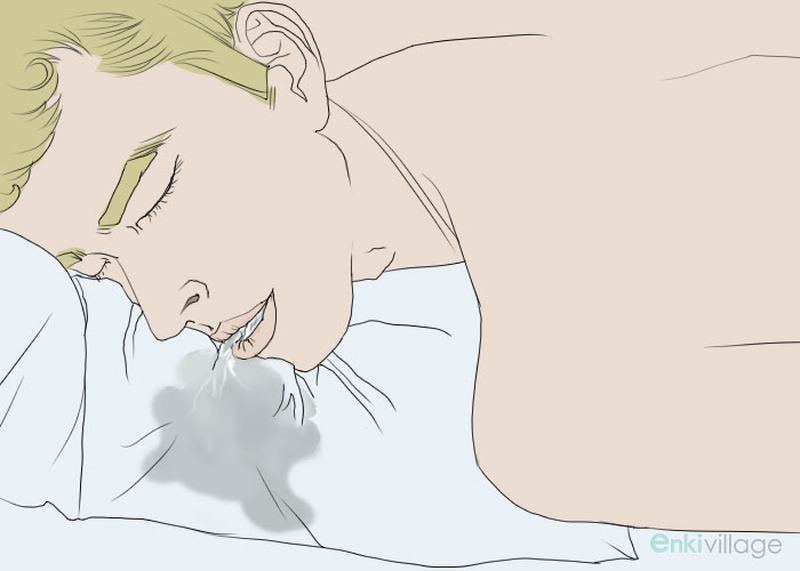Do you always wonder why you always notice a thin streak of saliva flowing out of your mouth when you wake up in the morning? Drooling while sleeping could happen for a number of reasons. It is a fairly common condition for most people, but sometimes, it could indicates a serious issue.
Drooling while sleeping or sialorrhea is not only about the production of excessive saliva, but about the secretion of saliva that drools out of your mouth. You actually produce more saliva in a waking state, but you keep swallowing that, which you cannot do consistently when you're in deep sleep. This often makes people ask, "Why do I drool when I sleep?" You need to know that a number of things can contribute to this situation and you can actually make things better by taking certain steps.

What Causes Drooling While Sleeping?
Side Sleep Posture
Are you a side sleeper? This may well be the answer to "Why do I drool in my sleep?" When you sleep on your side, gravity can cause your mouth to open and make drool pool on the pillow instead of draining down. This is one of the most common causes for drooling while sleeping.
Sinus Infection
The reason behind your swallowing and breathing problems may be a sinus infection. This may as well cause drooling while sleeping. You may also notice your condition becoming worse when you have flu – this blocks your nasal passage, making you breathe through your mouth and causing saliva to flow out of your mouth.
Acidity or GERD
If you're suffering from acidity or GERD, this may be the reason why you're producing excessive saliva. Acidity makes the gastric acid to stimulate your esophagus, which in turn excites the esophagosalivary reflex and causes excessive saliva production.
Allergies or Poisoning
Your body may be producing excessive saliva due to allergic rhinitis, food allergy, poisoning especially pesticides and reaction to insect or snake venom. These conditions often result in excessive drooling. Sometimes severe allergy or poisoning can be a life-threatening situation, so it’s important to seek medical help in time if such allergies or poisoning occurs.
Tonsillitis
Tonsils are the glands present at the back of your throat. These glands sometimes become inflamed and restrict the drainage of accumulated saliva down your throat. This inflammation is called tonsillitis, which is a common cause for drooling when sleeping. You may also experience drooling due to strep throat.
Dental Problems
Gum or teeth infections, teething, and other dental problems can also increase the production of saliva.
Use of Certain Medications
One of the side effects of some specific medications is excessive drooling. The list includes Central Nervous System depressants, antidepressants, and medications such as pilocarpine and morphine.
Anatomy of the Mouth
The anatomy of your mouth may also contribute to drooling. Some people find it difficult to close their lips while sleeping. They face this difficulty due to a large tongue, enlarged tonsils, crowded teeth or swollen adenoids.
Neurological Disorders
You may find it difficult to manage saliva when you're suffering from a neurological disorder. It could be due to cerebral palsy, facial paralysis, Parkinson's disease, Alzheimer's disease, stroke, Autism Down syndrome, Amyotrophic lateral sclerosis or multiple sclerosis.
Other Causes
Pregnancy side effects such as reflux or nausea
Diets high in acidic content
Mononucleosis
How to Prevent Drooling While Sleeping
Sleep on Your Back
Sleeping on your back is a good idea because it helps saliva settle right at the back of your throat, which eventual drains down. It is a good idea to tuck yourself in so that you don't change side while sleeping. Start sleeping on your back and you will notice a substantial improvement in your condition.
Prop Your Head Up
Propping your head up may also help when sleeping at night. Propping yourself in a vertical position will help keep your mouth close, which will prevent drooling.
Consult Your Doctor About Medications
Your body may produce excessive saliva as a side effect of the medications you are taking. Talk to your doctor and see if they can help you to make some changes when the medications are the culprit.
Breathe Through Your Nose
Mouth-breathing is one of the major causes of drooling when sleeping. It is common to sleep through mouth when you have a cold, but taking nasal decongestants may help relieve the blockage.
Practice Deep Breathing
It is also a good idea to add deep breathing exercises to your routine if you tend to breathe through mouth for no apparent reason. These exercises help to correct your breathing pattern and even help to manage stress better.
For Allergies
Take OTC allergy medications if your allergies are making it difficult to breathe through your nose. You can see an allergist to identify the best way to keep your nasal passages clear.

View All Comments /Add Comment